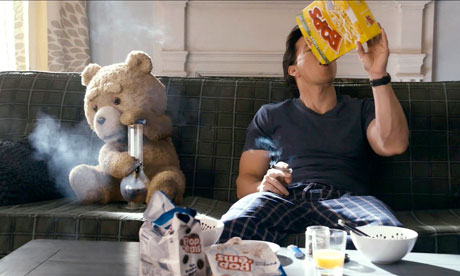Stolid, easygoing Mark Wahlberg stars as John Bennett, who as a lonely and unhappy child growing up in 1980s Massachusetts made a poignant Christmas wish on a falling star. He yearned for his teddy bear, named Teddy, to come to life … and so it did. We see the process of Teddy becoming a national sensation with TV appearances on Johnny Carson, but before you know it, they are both grown up, and Teddy has become curtly abbreviated to Ted (voiced by MacFarlane). He's a has-been, an ex-celebrity, depressed and foul-mouthed, addicted to casual and demeaning sex, smoking weed with his feckless buddy John on the couch at nine in the morning, or in the park, and complaining that he feels like one of the cast members of Diff'rent Strokes – "You know, the live ones." As for John, his adulthood has been catastrophically impaired by loyalty to his friend, the way the mental age of famous people is frozen at the age at which they became famous. He is working for a boring car-hire company, but is living with a beautiful, ambitious and very tolerant career woman, Lori (Mila Kunis), who is sick of sharing her man with a talking toy bear. Soon it will be time for John to make a big life choice. Either Ted goes – or she does.
It might be a stretch to claim that Ted is a satirical commentary on the infantilised state of western male culture, because it is not so much a satire as a cheerfully and unironically supportive celebration. Ted could, with some script tweaks, be read as some sort of M Night Shyamalan-type mystery, or a wish-fulfilment tale of males somehow finding a way to let their id cathartically speak out, loud and proud – though here again we are straying into Gibson/Beaver territory.

Shamelessly incorrect ... Mark Wahlberg and Seth MacFarlance in Ted. Photograph: Universal Pictures/Sportsphoto Ltd/Allstar
Britain's current Olympic mood – generous, wholesome and healthily upbeat – is very wrong for this film. Seth MacFarlane, the creator of TV's Family Guy, has co-written and directed a stoner fantasy comedy which is cynical and lethargic, sour and dour; it is misanthropic, crass, facetious, offensive, immature and very funny. Ted is about a grown man's relationship with a non-imaginary imaginary animal; it is quite without the sympathetic, redemptive notes of films such as Harvey or ET or the Toy Stories, movies to which it would not dare or bother to compare itself. However, compared to The Beaver starring Mel Gibson, the tale of a menopausal executive who speaks to a hand puppet, Ted is a watercolour exercise in whimsical charm
Actually, it is probably simply another example of the nostalgia to which screen comics are prone: the nostalgia for the student or ex-student days of messing around, talking about stupid TV shows and pop culture and having fun – the playful atmosphere from which their deadly serious vocation of comedy originally sprang. It is the same mood as that in Old School, or Knocked Up, or The 40-Year-Old Virgin: a man-boy world of guys who accept the future necessity of working for a living and want to escape it. A toy bear toils not, neither does it spin, and so exercises an awful fascination.
In Ted, MacFarlane includes a derogatory reference to Adam Sandler's appalling comedy Jack and Jill: and of course how could any reference to that film be anything other than derogatory? Yet there are Sandlerisms here. The poster showing John and Ted at the urinals is very like that for Sandler's foster-father comedy Big Daddy (1999), and in fact the knowing, goof-off mood is reminiscent of Judd Apatow's interesting filmFunny People, about the emotionally paralysed life of a madly successful Hollywood comedian.
This unfolds in a series of vignettes without all that much in the way of an important narrative arc, and I admit Mila Kunis's role is a pretty thankless one. But in its shamelessly incorrect way, it is very funny. I enjoyed Ted and John's bizarre exchange on the subject of white-trash names, their final falling out, and the subsequent brutal and extended fight in a hotel room. This film may well be dismissed by some with the phrase "comedy is very subjective", a phrase traditionally used by pundits to mean: "This is absolutely and objectively unfunny but I am far too wearily mature to argue about it." In my experience, comedy is subjective, but no more so than anything else. Ted has nothing much to offer in terms of subtlety and sensitivity, but there are plenty of laughs.
No comments:
Post a Comment